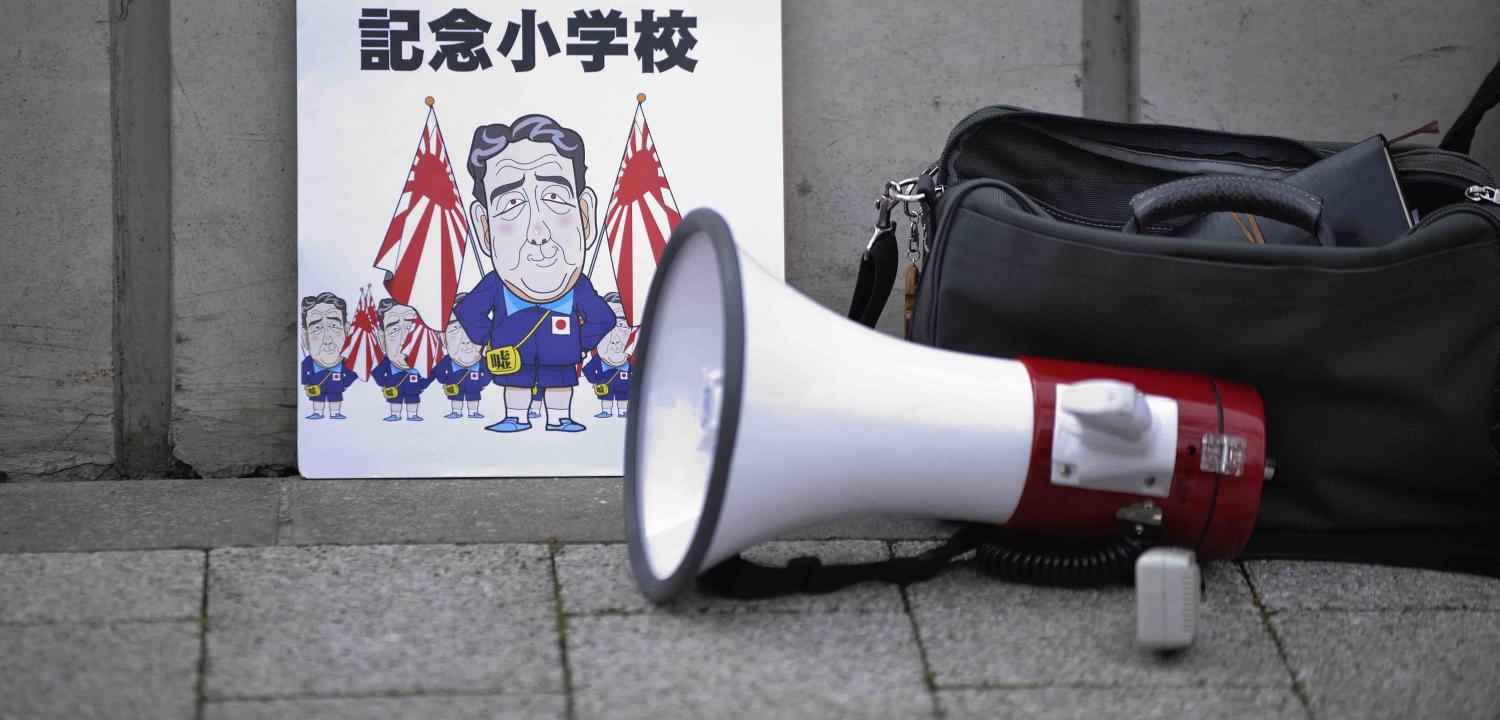Sunday 11 March marked the seventh anniversary of the Tohoku triple disaster, when a powerful earthquake off Japan’s Pacific coast and the subsequent tsunami devastated communities and smashed the Fukushima Daiichi Nuclear Power Plant. To mark the anniversary, Tokyo’s subway trains, famous for always being on time, paused at 2.46 pm to remember the victims of the disaster and its aftermath.
I was on a train that stopped at Nagatacho Station, almost directly beneath the national parliamentary building. It was a poignant moment. Most passengers bowed their heads.
Meanwhile, in the parliamentary precinct above, further revelations surrounding the government’s involvement in the ongoing Moritomo Gakuen scandal emerged.
Prime Minister Shinzo Abe and the Liberal Democratic Party (LDP) regained power in 2012, in the wake of the triple disaster, with a campaign that cited the incompetence of Democratic Party leaders and promised to “reclaim Japan” and, by inference, rebuild trust in government.
However, this trust is hard-won when questions persist about the heavily discounted sale of state-owned land to school operator Moritomo Gakuen, which has ties to Abe’s wife, Akie. The controversy has also engulfed Abe ally and Finance Minister Taro Aso, amid claims of a cover-up.
When the digging goes too deep, Abe mimics the right’s predilection for dismissing “fake news”, and has so far ridden out the scandal on a wave of faux populism. The Asahi Shimbun and Tokyo Shimbun newspapers are particular sources of the government’s ire.
The electorate is sceptical but wary of the opposition parties. Abe is driving to change the peace clause of the constitution, which the public instinctively sees as wrong yet maybe in the national interest. Abe is also striving to convince his party to extend his tenure for an unprecedented third term later this year.
Yet Moritomo Gakuen is the scandal that just won’t go away. Abe’s gamble on the 2017 snap election ultimately paid off for him and the LDP, although not before a drop in opinion polls. The fact that the opposition parties fumbled their way to defeat via an implosion of monumental proportions (from which there are signs of a recovery) ultimately got Abe and the LDP over the line.
While the Prime Minister has been energetic on security issues – pressing for constitutional reform, citing the threat from North Korea – the opposition and progressive media have opted to pursue the Moritomo scandal in parliament, in committees, and via social media. It is an interesting, arguably poll-driven, strategy.
This week’s revelations have brought new details to light. Morning television shows and late-night radio programs pore over details of changes or alterations (different media outlets are using different terms to describe the evidence) revealed to have made to documents during the government’s interrogation in parliament. Numbers have been changed, names deleted, details obscured.
Abe previously boasted he would resign should his wife (also deeply implicated in the direction of the school’s conservative moral education) be named. Some are suggesting hers is one of the names deleted from the documents.
The latest disclosures have led to the resignation of a top bureaucrat, have been suggested as a reason behind the death of another civil servant, and led to calls for Abe’s deputy PM to step down. Abe remains resolute, hoping his apology will tide him over.
Last year’s Japanese “word of the year”, sontaku (attempts to ingratiate oneself with superiors), is again being used in ways unflattering to the government. The voters are dismayed, their trust in government ebbing once more.
Twitterites rally around parliament in a fashion reminiscent of the 2015 anti-security legislation rallies, calling for Abe to resign and asking for the truth to be told. The threads of democracy’s rich tapestry are threatening to messily unravel.
In a different political time, perhaps when democracy meant something else, a prime minister in Abe’s position would have resigned.
The Prime Minister is compromised. His vainglorious desire to reach a post-war record of prime ministerial longevity clouds any moral reason. It is a prize he wants at any cost (cloaked in missives about what is best for the nation), but even members of his party who must vote for or against Abe’s third term later this year are openly hedging their bets. What price are they willing to pay for their political allegiances?
Abe’s resilience cannot be underestimated. It might not be the big questions posed by security experts – to arm or not to arm, to revise or not to revise a peace clause – that bring him down, but his and his wife’s protection of their mates. Ironic that their support for a school which sought to espouse and uphold a higher moral purpose could lead to their political demise.
The Prime Minister knows he needs to survive this scandal to realise his much-vaunted revision of the constitution. Of the serious contenders for the LDP leadership, few share Abe’s resolute determination for a “militarised Self Defence Force with peaceful characteristics”.
One reading of the Japanese characters for Moritomo (森友) suggests a forest and friends. This scandal, notwithstanding its slow burn, might yet ultimately banish Abe to the wilderness.

